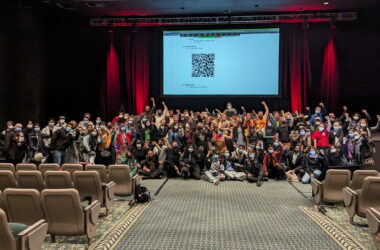 Ryan Reisert
Ryan Reisert Ryan Reisert
Ryan ReisertCanadian Senator Serge Joyal joined Richard Schultz, chair of McGill’s political science department, in a panel discussion on Thursday about the Canadian government’s plans for Senate reform.
The Harper government has introduced two bills on the issue: one bill proposes an eight-year maximum term for senators, and the other bill calls for the election of senators by provincial votes.
Joyal contended that these bills would amount to an unconstitutional change that would transfer power from the federal government to the provinces.
“It would be as if we are importing the 10 provincial premiers into the Senate,” he said.
Schultz agreed that any change must consider the complex distribution of power and the Constitution, but he still argued that reforms must occur.
“The contemporary Senate, for all the good it has done, is fundamentally flawed in that it lacks legitimacy,” Schultz said.
Joyal emphasized the need to objectively understand the Senate as an institution before calling for reform. He stressed that changing part of the structure of the Canadian Constitution cannot occur without first considering how it will impact the whole body of the Constitution.
“If you change the volume of air in one room, it will have an impact on the air conditioning system,” he said.
Joyal explained that if senators were to be elected, they would have to be elected in different districts than the MPs, which would not only increase government costs, but also create competition between fellow party members.
According to Joyal, it is essential to have a body like the Senate to take a second look at issues.
“The Senate is less partisan … since we don’t need to be elected we are not hostage to the pressure from different groups, whereas MPs are subject to that pressure,” said Joyal.
Joyal also said that an elected Senate would create problems for Canada’s minority government. He argued that in a minority government it is always difficult to pass a bill through three stages. With provincially elected senators, the same issues would arise in the Senate, essentially duplicating the House of Commons.
“It would create a system of slowing down the machine,” he said.
Schultz maintained that because the Senate is increasingly becoming a mirror image to the House of Commons, Senate reform is crucial.
“There is something fundamentally wrong when a single individual, Liberal or Conservative, has the ability to appoint powers to an institution that has the same powers as the [elected] House of Commons,” he said.
Schultz contended that an elected Senate would be ideal. However, he noted that elections are not a way to fashion a legitimate democracy.
“We simply argue for elections as if that’s the ideal form of democracy,” he said. “I don’t think we should elect judges.”
Schultz agreed with Joyal that an elected Senate would result in power concentrated in provincial regions, actually denying proportional representation.
For example, Quebec is divided into 24 senatorial districts, with some in densely populated regions and others in the rural areas. One of the senatorial districts overlaps Quebec and Newfoundland, where there would have to be a combined election.
“So we would have great discrepancies in representation that are grossly unfair,” Schultz said, explaining that such a situation would lead to incredible arguments if the power of the Senate and its relationship with the House of Commons were not changed. He argued for an institutional modification, but not a constitutional change.
“Mr. Harper’s proposals constitute a radical change in our Constitution,” he said. “I think the Senate should be reformed in order to enhance the legitimacy of senators. Election is one way, but it would require Constitutional reform that I don’t think we should do.”
Schultz added that although there should be a change in tenure, eight years is an inadequate time period because the turnover would be too high, and it would thus reinforce the power of the executive.
“Eight years is extremely short,” he said. “You would never have to face accountability. We don’t want another house of short-term amateurs.”
U3 political science student Andrew Bonnell said that Joyal and Schultz’s discussion shifted his opinion on Senate reform.
“I was very pro-election for Senators,” he said. “I still think that there needs to be reform, but since listening to this panel, I don’t necessarily think electing a Senate on a provincial basis is the best route.”








